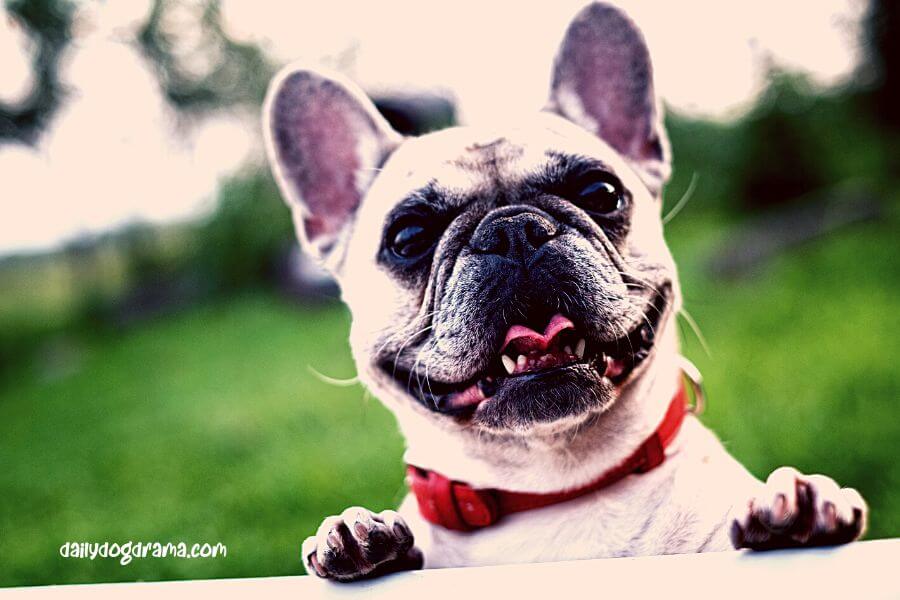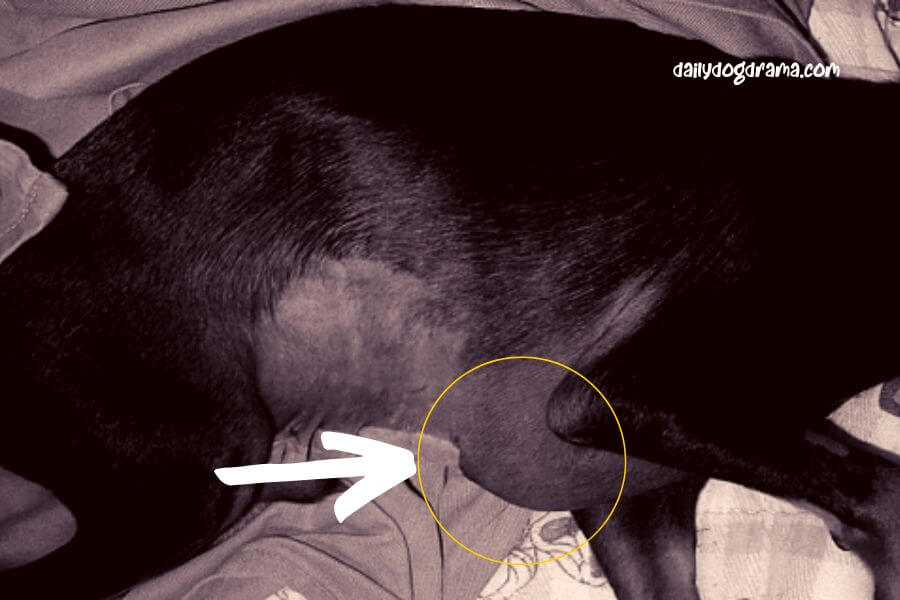Do you know what DOG ESSENTIALS you are missing out? Find out now!
Zack Keithy, our author, is a certified veterinarian technician (UC Blue Ash) for over 6 years (contact him here). The articles written here are based on his expertise and experience, combined with a review by our expert vet reviewers including Dr M. Tarantino. Learn more about us here.
It has been well documented that French bulldogs tend to have more health issues than other dogs. One such issue impacts their physical appearance and is cause for concern for many dog parents.
Does your French bulldog have a pigeon chest?
What causes it and should you be worried about it?
In this post, I will share some insights into this condition and provide some advice on how you can handle it.

Medical Questions? Talk to a Veterinarian 24/7.
Connect one-on-one with a licensed vet who will answer your questions in minutes.
*Article may contain affiliate links to retailers like Amazon and Chewy. Learn more on our disclosure page.
- What is pigeon chest in French bulldogs?
- Symptoms of pigeon chest in french bulldogs
- Causes of chest deformity in dogs
- Can pigeon chest in your French bulldog be fixed?
- Is pigeon chest in dogs genetic?
- Pectus Excavatum
- Other abnormalities that might be present
- What should you do?
- In Conclusion: Pigeon Chest French Bulldog
What is pigeon chest in French bulldogs?
Pigeon chest is also known as Pectus carinatum and this is a chest bone deformity that can happen in all dogs, in which some people describe it as a dog with pointy chest bone, or simply pigeon chest dog.
When a dog has this condition, its chest and rib disfigurement causes it to have a pointed chest rather than a curved one.
The manubrium of sternum of dogs with pectus carinatum comes to a point instead of curving.
This bump can be felt even in young puppies.
Males are significantly more likely than females to develop the malformation.
Dogs with pectus carinatum can have other problems, such as scoliosis and spine curvature, or compromised lung and cardiac function in severely affected dogs.
Most pigeon-chested dogs, however, lead very typical lives, but they may not be able to partake in strenuous activities.
Pigeon chest is a congenital deformity that affects a very small population of dogs, and there might not be any need for concern.
Read on as we examine more of this condition.
Doggy says, consider reading this too: Should I Buy a Puppy With an Umbilical Hernia?
Symptoms of pigeon chest in french bulldogs
This condition forms before or when your Frenchie is born, and in most cases, it is very obvious to spot it. It looks like there is a bone jutting out of the chest of your dog that is unnatural looking.
Some of the symptoms you can observe are:
- Walking is difficult for your dog
- Dental issues
- Loss of appetite
- Inability to work out
- Wheezing
- Vomiting
- Skin and mucous membranes have a blue tinge (cyanosis)
- Outwardly bowed chest
- Breathing problems
- Depression
- Pointy chest
- Umbilical hernia
- Problems with digestion
- Legs that look disfigured
- Loss of weight
Causes of chest deformity in dogs
Chest deformities occur when bones grow abnormally during development. They’re usually caused by genetic factors and are hereditary.
Some breeds are prone to developing chest deformities, including French Bulldogs, Pekingese, Pug, Shih Tzu, and Yorkshire Terrier.
Can pigeon chest in your French bulldog be fixed?
There is no need for treatment if the deformity is mild and does not compress any important organs such as the lungs or heart.
Your vet will just keep an eye on your puppy to ensure that his or her lungs and heart do not become squeezed as it grows.
If your dog does require treatment, there are a couple available.
The first course of action typically revolves around physical therapy for your French bulldog.
Another common approach would be to get you the owner to manually compress the chest to shape the sternum and costal cartilages to take on a more convex form.
And lastly, in more extreme cases, surgery is used to correct the problem where the affected bone is removed and replaced with a fiberglass cast.

Is pigeon chest in dogs genetic?
Pigeon chests can be seen in many breeds of dogs, including French Bulldogs.
They’re usually inherited, meaning they run in families.
If this happens, there’s no need to worry. Your dog will grow out of it over time. But if you notice that your puppy has a pigeon chest at birth, you should consult your veterinarian right away.
Your vet will be able to determine whether your dog has a medical problem that requires treatment. If your dog does have a medical issue, your vet will recommend treatments that will help him feel better and live longer.
Pectus Excavatum
Another type of chest deformity known as pectus excavatum is much more common in dogs.
In this case, the chest narrows on one side due to malformed cartilage linking the sternum to the rib’s end in this disorder.
When this happens, the chest of the dog looks to be concave or flat.
Breathing problems are common in dogs born with pectus excavatum, but otherwise, they generally live normal lives.
If they are severely affected, surgery is a must. Otherwise, the dog will almost certainly have a shorter lifespan.
Other abnormalities that might be present
In some cases, there could be other abnormalities observed when a dog has chest bone deformity.
These include:
- An umbilical hernia
- Poor dental occlusion
- Bad limb angulations with ambulation difficulties
- Absence of testicles in the scrotum
You should know that these are exceedingly rare, especially if you got your dog from a reputable breeder.
What should you do?
What do you do with a dog chest bone sticking out?
If you discover that your Frenchie has an abnormal-looking chest, you should take the following actions:
Wait and observe
The fact is that pigeon chest is an extremely rare condition in French bulldogs, and even if it were present, they are able to live normal lives.
If they do not seem to have any problems (aside from the common ones), there is really nothing much you need to do about it except shower it with love and be the best dog parent you can be.
Reduce exercise intensity
On a similar note, you do not want to overload your Frenchie with too much exercise if you do notice that it has a pigeon chest.
Since the structure of the chest bone is compromised, it might not do well when it comes to physical activities.
Instead of going for 60-minute walks, start with 15-minute walks and slowly increase the amount of time.
Keep a close eye on your dog and stop immediately if you notice breathlessness or signs that it is struggling.
Notify your puppy’s breeder
Inbreeding can cause the next generation to take on deformities such as this.
If your dog has a pigeon chest, you should inform your breeder so that it can stop breeding the ones affected.
You should also expect an explanation from them about why this has happened, why they failed to inform you, and discuss a resolution.
Most breeders have it in their contract that they will take responsibility if an incident like this comes up, so be sure to talk this through with them.
Bring it to your vet for diagnosis
The only way to be sure is to visit your vet. They have the right equipment and imaging machines to determine if indeed your puppy is suffering from pigeon chest or similar deformities.
They are also able to advise you on the next best course of action.
In Conclusion: Pigeon Chest French Bulldog
In most cases, there shouldn’t be any cause for concern and your dog can live a normal life just like other dogs.
Only if you notice any issues that might cause major problems should you need to visit the vet.
Browse around for other dog care tips such as whether belly bands can cause UTI in dogs, what to do if your dog ate a pee pad, , and many more.
You’ve made it to the end, but I hope it’s not the end of our journey. We want to hear your voice! Share your thoughts, problems, suggestions, or anything related to your dog in the comments section. And don’t forget to join our newsletter today too.




